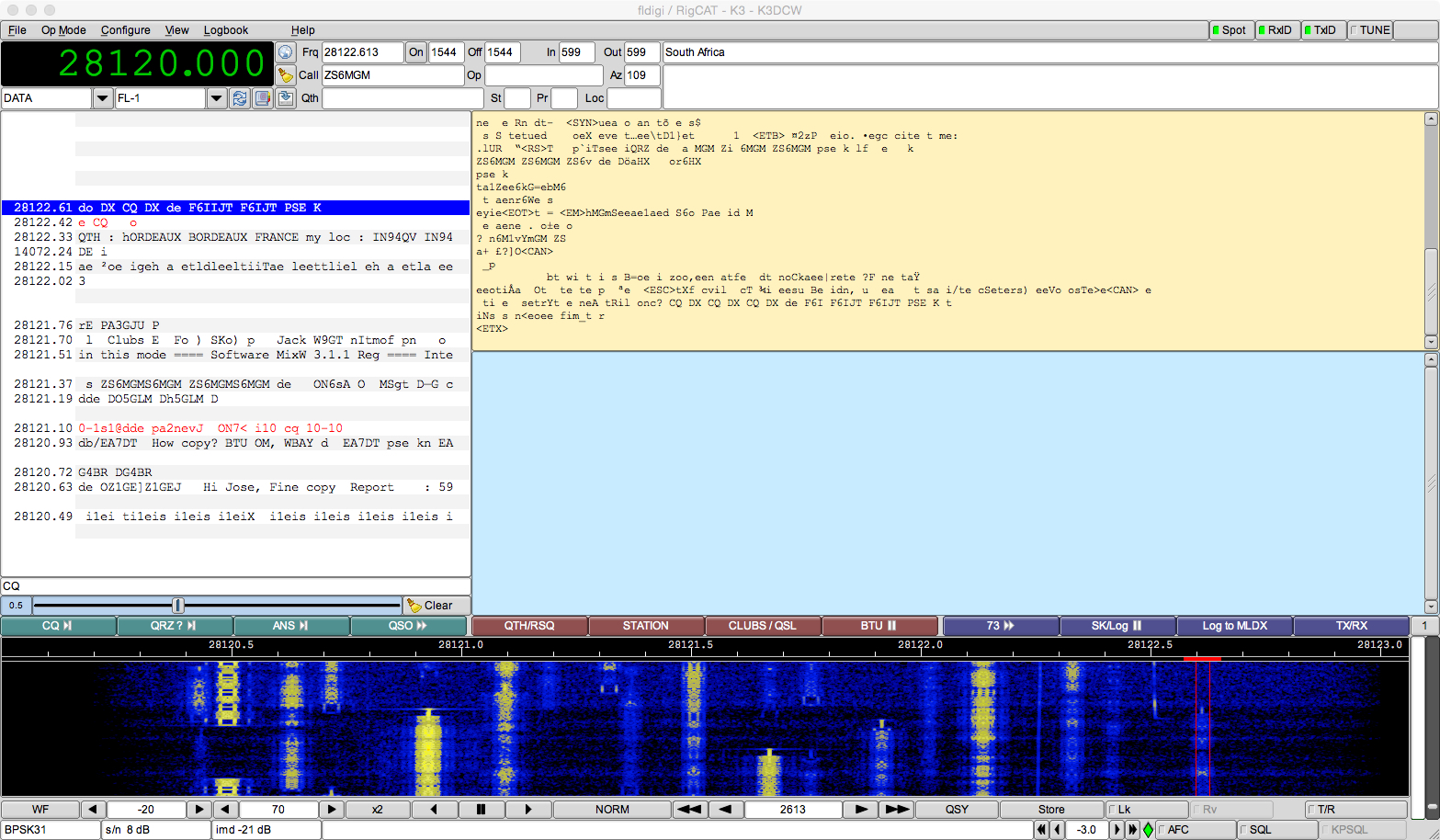Fldigi – Digital Modes on OS X
Fans of Digital Modes on OS X have two primary software packages to choose from; cocoaModem from W7AY and Fldigi from W1HKJ. While cocoaModem is an outstanding software package, it has not received an update since July 2012. Although lacking the cocoa features of cocoaModem, Fldigi has remained under constant development and it is arguably the premier digital modes software package available on any platform. For fans of digital modes, Fldigi cannot be beat in terms of support for more than 15 primary modes, dozens of submodes/variants including custom tone/bandwidth combinations of Olivia & Contestia, and the latest techniques such as RSID automatic mode detection. The supported mode list includes standards such as RTTY, PSK, and Olivia as well many other less-common modes. The complete mode listing is extensive and includes CW (audio-injected), Contestia (all variants), DominoEX (8 variants), Hellscreiber (7 variants), MFSK (11 variants), MT63 (6 variants), Olivia (all variants), PSK/QSPK (variants up to BPSK1000, including PSK63F and multiple PSKR variants), RTTY (multiple speeds, customizable shifts, but AFSK only), THOR (10 variants), Throb (6 variants including ThrobX), WEFAX, SITOR-B/NAVTEX and more. Furthermore, Fldigi incorporates the exclusive implementation of multi-carrier versions of many digital modes, allowing transmission of data at speeds approaching that of Pactor III without the need for expensive proprietary hardware. Fldigi can even be used to log SSB QSOs by selecting SSB from the mode menu.
Beyond just a large number of digital modes, Fldigi incorporates many other features of interest to digital mode fans. The most significant feature is full support for RSID (Reed Solomon ID) which provides a means for identifying unknown modes. When encountering an unknown mode, if the user is sending the RSID signal, the receiver can identify and tune to the correct mode either automatically or manually with a simple click of the morse. During transmission, the use of RSID significantly increases the rate of return on CQs when operating using unusual digital modes. Fldigi’s RSID implementation includes the extended RSID protocol for use with newer modes and fully supports identification of all modes currently supported by the RSID protocol
Fldigi includes full integrated rig control using Hamlib, the W1HKJ-developed RigCAT protocol, or via XML-RPC with the Flrig program provided by W1HKJ. Utilizing the XML-RPC protocol, other software can be also configured to provide rig control, such as done by Tom, DL2RUM, with his RUMlog logging software. (http://dl2rum.de/rumsoft/RUMLog.html).
Fldigi also provides full support for call lookup using QRZ.com, HamQTH.com, HamCall, Callook.info, and even CDROM support for various call books. Additional useful features includes multi-channel simultaneous decode using the signal browser, integrated ADIF-formatted logbook, full support for upload (including automatic upload if desired) to eQSL, export to KML for Google Earth, support for automatic download of current weather conditions for use in macros, upload to PSKreporter, contesting support including serial numbers and dupe checking, fully customizable macro scripting, support for the PSKmail project, integration of DTMF tones for VHF/UHF usage, and much much more.
Integration with OS X logbook software varies by author. RUMlog provides the tightest integration with support for sharing rig control (via XML-RPC), call sign lookup, and automatic importing of logs and data from Fldigi to RUMlog. Support for automatic importing of logs from Fldigi to Aether or MacLoggerDX is supported by AppleScript executable from within Fldigi (http://www.kj6msg.com/2013/09/fldigi-aether-logger.html). For all logbooks, manual import of Fldigi’s ADIF-formatted logbook is available as well.
Developed by the 2014 ARRL Technical Excellence Award winner, Dave Freese W1HKJ, Fldigi is an open-source, cross-platform package that is part of the Fl* suite of programs. Fldigi can be incorporated into ARES/MARS/RACES/EmComm messaging activity using the supplemental programs like Flarq, Flwrap, and Flmsg. Fldigi can also support Multicast operations (like that used by the Salvation Army’s SATERN net) with the Flamp program. For those desiring more extensive rig control, Fldigi can integrate completely with Flrig for full control of most rig functions. There are also standalone log programs and Net Control packages that can be used as well. Besides OS X, Fldigi can also run on Linux, Windows, and BSD. Like other packages within the Fl* suite of programs, Fldigi can be run on older Macs using the PowerPC chips as well as on the latest Intel chip sets.
As of this writing, Fldigi is currently on version 3.21.82 and can be downloaded from www.w1hkj.com/download.html


October 17, 2021 @ 9:44 am
““fldigi-4.1.20” can’t be opened because Apple cannot check it for malicious software. This software needs to be updated. Contact the developer for more information.
This item is on the disk image “fldigi-4.1.20_bs.dmg”. Firefox downloaded this disk image today at 4:34 AM from http://www.w1hkj.com.”
running big sur on mac mini 8.1
May 8, 2022 @ 7:31 pm
After opening the disk image, drag the application to your Applications folder (like you do for most software delivered in .DMG files)
Open the applications folder in your Finder.
Right-click on the fldigi icon, and then choose “Open”.
Then confirm that you want to open the application, even though Apple can’t verify it.
After you’ve opened it this way once, you’ll be able to open it the normal way in the future.